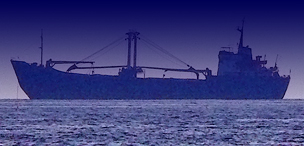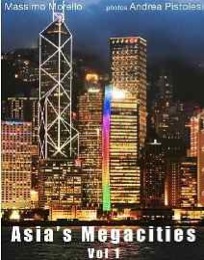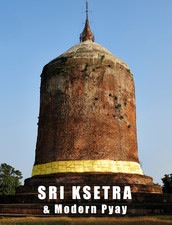Jun 2012
Panda help me
27/06/12 20:20 Filed in: Stories
A story of Chinese boxes. We would need to search through the boxes and then put together what we have found. You might end up with a great story on Asia. About the past and the future. The present, as we know, doesn’t exist, and it's even more fluid in Asia.
For now – but which now? – you can find traces of it in Stories: The dragon Lady, the Taoist and other demons.
For the future, who knows? I would like to return to Kep, and I have to go to Phnom Penh for the Asean summit. As for Chongqing there is a new Air Asia flight from Bangkok and I might take the chance to visit the city zoo.
If nothing else, I can see the pandas. And, you know, everybody loves pandas.

For now – but which now? – you can find traces of it in Stories: The dragon Lady, the Taoist and other demons.
For the future, who knows? I would like to return to Kep, and I have to go to Phnom Penh for the Asean summit. As for Chongqing there is a new Air Asia flight from Bangkok and I might take the chance to visit the city zoo.
If nothing else, I can see the pandas. And, you know, everybody loves pandas.

0 Comments
Death Elsewhere
22/06/12 11:42 Filed in: Stories
Vacation, Elsewhere. Two words expressing two myths. Often bindingly linked. The vacation is elsewhere. The elsewhere is a vacation, in that it is a place where we can unplug (or at least we think we can) from our thoughts, anxieties and day-to-day problems. One of these words, however, takes on an unsettling meaning, especially in Italian culture. And that is Elsewhere. It’s a place where everything is different, unknown, potentially hostile, where even the food can be a source of hidden danger. That is when a vacation elsewhere can change from a dream to a nightmare. To say nothing of when the elsewhere becomes the scene of a crime.
This is the meaning of the text published in the Stories section. Entitled Death in Remote Places, it is taken from a recently released book, Faking It in Bangkok, which draws together articles and blog posts by Christopher G. Moore, a Canadian writer living in Thailand since 1988, known mainly for his short stories and novels in the crime and noir genre, set in South-East Asia.
That (or this, for Moore and for others writing about it) is the overriding image of Elsewhere, with all of its real or presumed human, natural and cultural exoticisms. There (or here), every plot is packed with mystery and, to use another platitude, reality becomes fiction. This generates a paradoxical morbid fascination, further feeding the myth of Elsewhere. In a, literally, vicious circle.
In the meantime, to confirm what Moore writes, and worthy of one of his thrillers, we have the case of the two Canadian sisters recently found dead in their hotel room on Phi Phi Island, one of those places symbolic of exotic vacations, and also the location for the Leonardo Di Caprio film, The Beach (which also relates the tale of a dream vacation going horribly wrong).
The two sisters showed no signs of violence and do not appear to have been the victims of crime. Initial reports indicate they may have died from food poisoning, but the causes are yet to be clarified. The very similar deaths of two other female tourists, an American and a Norwegian, on the same island in 2009 remain unresolved to this day. Assisting with the investigation is Dr Pornthip Rojanasunand, director of the Thai forensic pathology institute, the Asian incarnation of Kay Scarpetta, created by thriller author Patricia Cornwell. Far from being reassuring, this sends a few shivers down the spine. Which, in this heat, is not unwelcome.
 Et in Arcadia ego, a painting by Guercino (1591-1668). The inscription at the bottom of the painting can be literally translated "Even in Arcadia I”. Open to interpretation, in this case it reminds us of the omnipresence of death in space and time. At all times and everywhere, even in utopian places such as Arcadia.
Et in Arcadia ego, a painting by Guercino (1591-1668). The inscription at the bottom of the painting can be literally translated "Even in Arcadia I”. Open to interpretation, in this case it reminds us of the omnipresence of death in space and time. At all times and everywhere, even in utopian places such as Arcadia.
This is the meaning of the text published in the Stories section. Entitled Death in Remote Places, it is taken from a recently released book, Faking It in Bangkok, which draws together articles and blog posts by Christopher G. Moore, a Canadian writer living in Thailand since 1988, known mainly for his short stories and novels in the crime and noir genre, set in South-East Asia.
That (or this, for Moore and for others writing about it) is the overriding image of Elsewhere, with all of its real or presumed human, natural and cultural exoticisms. There (or here), every plot is packed with mystery and, to use another platitude, reality becomes fiction. This generates a paradoxical morbid fascination, further feeding the myth of Elsewhere. In a, literally, vicious circle.
In the meantime, to confirm what Moore writes, and worthy of one of his thrillers, we have the case of the two Canadian sisters recently found dead in their hotel room on Phi Phi Island, one of those places symbolic of exotic vacations, and also the location for the Leonardo Di Caprio film, The Beach (which also relates the tale of a dream vacation going horribly wrong).
The two sisters showed no signs of violence and do not appear to have been the victims of crime. Initial reports indicate they may have died from food poisoning, but the causes are yet to be clarified. The very similar deaths of two other female tourists, an American and a Norwegian, on the same island in 2009 remain unresolved to this day. Assisting with the investigation is Dr Pornthip Rojanasunand, director of the Thai forensic pathology institute, the Asian incarnation of Kay Scarpetta, created by thriller author Patricia Cornwell. Far from being reassuring, this sends a few shivers down the spine. Which, in this heat, is not unwelcome.
 Et in Arcadia ego, a painting by Guercino (1591-1668). The inscription at the bottom of the painting can be literally translated "Even in Arcadia I”. Open to interpretation, in this case it reminds us of the omnipresence of death in space and time. At all times and everywhere, even in utopian places such as Arcadia.
Et in Arcadia ego, a painting by Guercino (1591-1668). The inscription at the bottom of the painting can be literally translated "Even in Arcadia I”. Open to interpretation, in this case it reminds us of the omnipresence of death in space and time. At all times and everywhere, even in utopian places such as Arcadia.




